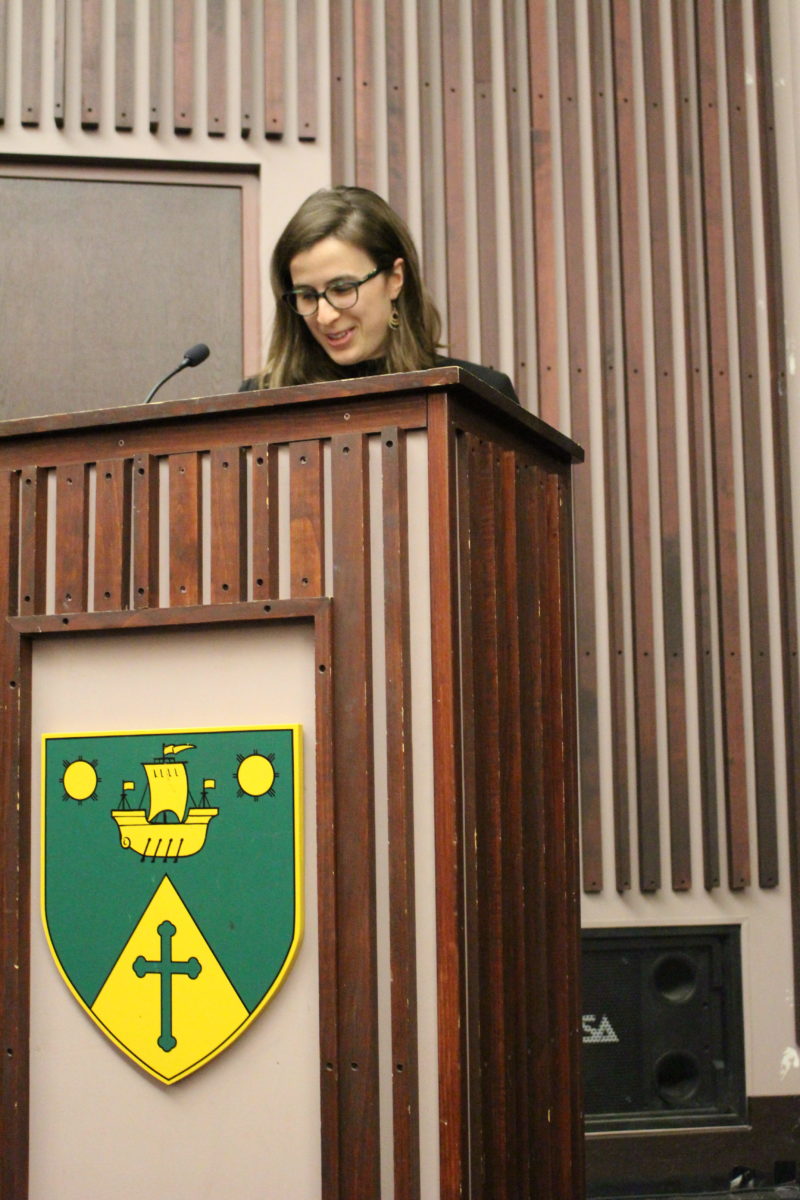Professor Matt Dinan and fourth-year student Hannah Zamora went head-to-head in a debate about which play is better, Hamelt or Rosencrantz and Guildenstern are Dead, in Ted Daigle Auditorium on Nov. 17.
The debate was a preliminary event to prepare Fredericton theatre-goers for Theatre St. Thomas’ production of Rosencrantz and Guildenstern are Dead, which premieres this week in the Black Box Theatre.
Dinan was team Rosencrantz and Guildenstern are Dead while Zamora was team Hamlet.
Zamora kicked off the debate by addressing the topics of death and freedom in Hamlet.
Zamora argued throughout the play Hamlet struggles with questions about life and who he is and which are clearly seen in his monologues, where he asks himself who he is and what he is supposed to do.

According to Zamora, Shakespeare provides freedom in the text of Hamlet. In the play, audiences see the characters partially unfolding themselves and a freedom is found in the unfurling of the character, freedom and the lack of definitive answers.
Dinan started off his speech with a humourous anecdote, saying early last week he tweeted he would confront Zamora in the debate, and one of his colleagues tweeted back, “LOL, she’s gonna destroy you.”
The audience erupted into laughter, and Dinan used this as an example to state you can take tragedy — his acknowledgement he may lose — and turn it into comedy, just as Rosencrantz and Guildenstern are Dead does.
Dinan argued Rosencrantz and Guildenstern are Dead provides better resources, since the audience can identify more with comedy than with tragedy.
He also addressed the topic of the consciousness of death, stating human beings all are in the boat of death along with Rosencrantz and Guildenstern, meaning today’s citizens are not very different from them.
“If we all die, we are all in the same boat,” he said. “We know how [Rosencrantz and Guildenstern are Dead] is going to end, which means we know how our story will end.”
Dinan’s argument led to the discussion about how the audience identifies with Rosencrantz and Guildenstern.
“We care for the characters when they die because we recognize ourselves in them,” said Dinan.
However, Zamora argued love doesn’t hold the same weight in Tom Stoppard’s rendition as it does in Hamlet.
“Hamlet inspires others to be honest with themselves because love and honesty are portrayed in him,” said Zamora.
After the speeches ended, the audience asked questions. The audience, who judged the debate, decided there was a tie between the speakers.
Zamora and Dinan were very pleased with how the discussion turned out said they are very excited to attend the play next week.
“Ilkay [Silk] is a treasure. The TST cast puts a lot of thought into their performances. I’m quite confident they’ll do justice to the script,” said Dinan.
“[Rosencrantz and Guildenstern are Dead] is such a fun play. I’m expecting to enjoy it very much,” said Zamora.